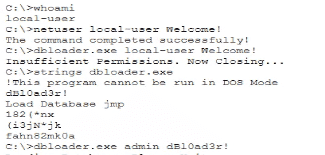An auditor is reviewing the logs from a web application to determine the source of an incident. The web application architecture includes an internet-accessible application load balancer, a number of web servers in a private subnet, application servers, and one database server in a tiered configuration. The application load balancer cannot store the logs. The following are sample log snippets:
Web server logs:
192.168.1.10 - - [24/Oct/2020 11:24:34 +05:00] "GET /bin/bash" HTTP/1.1" 200 453 Safari/536.36
192.168.1.10 - - [24/Oct/2020 11:24:35 +05:00] "GET / HTTP/1.1" 200 453 Safari/536.36
Application server logs:
24/Oct/2020 11:24:34 +05:00 - 192.168.2.11 - request does not match a known local user. Querying DB
24/Oct/2020 11:24:35 +05:00 - 192.168.2.12 - root path. Begin processing
Database server logs:
24/Oct/2020 11:24:34 +05:00 [Warning] 'option read_buffer_size1 unassigned value 0 adjusted to 2048
24/Oct/2020 11:24:35 +05:00 [Warning] CA certificate ca.pem is self-signed.
Which of the following should the auditor recommend to ensure future incidents can be traced back to the sources?
Show Answer
Hide Answer
Correct Answer:
A
The issue is tracing the original source of requests in a tiered architecture with a load balancer. The web server logs show internal IPs (192.168.1.10), not the external client IPs, because the load balancer forwards requests without preserving the source. Enabling theX-Forwarded-Forheader on the load balancer adds the client's original IP to the HTTP request headers, allowing downstream servers to log it. This ensures traceability without altering the architecture significantly.
Option A:Correct---X-Forwarded-For is the standard solution for preserving client IPs through load balancers.
Option B:A Host-based Intrusion Detection System (HIDS) detects anomalies but doesn't address IP traceability.
Option C:A trusted CA certificate fixes the self-signed warning but is unrelated to source tracking.
Option D:Stored procedures improve database security but don't help with IP logging.
Option E:Storing $_SERVER['REMOTE_ADDR'] captures the loadbalancer's IP, not the client's, unless X-Forwarded-For is enabled.



